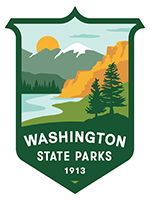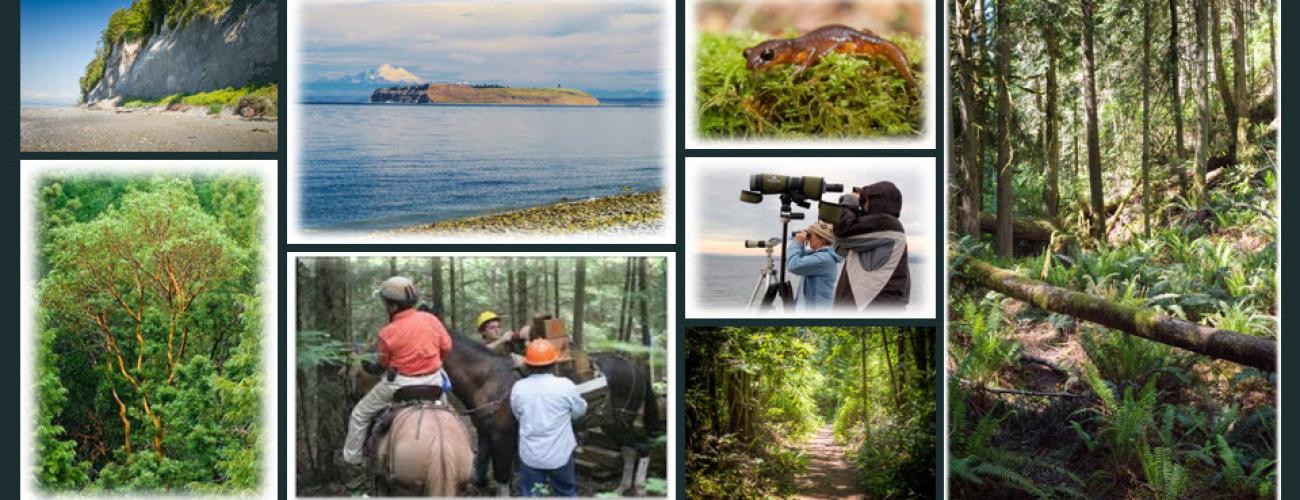Miller Peninsula State Park Property Planning
Project summary
The Washington State Parks and Recreation Commission is developing a long-range plan for its property located on Miller Peninsula. This 2,800-acre undeveloped park is located in the north Olympic Peninsula, just east of Sequim and north of Highway 101 in Clallam County. The property includes a trail system for hikers, mountain bikers, and equestrians through a beautiful second-growth forest. It also includes three miles of saltwater shoreline on the Strait of Juan de Fuca and Discovery Bay, but most of the shore is high-bank, so shore access is limited.
- Estimated start date: January 2023
- Budget: State Parks requested funding for the Master Planning, Cultural Resource Survey, and an Environmental Impact Statement for the 2023-25 biennium, which includes $200k to be spent by June 30, 2024, followed by $400k to be spent by June 30, 2025. State Parks completed the Cultural Resource Survey, Forest Health Assessment, and is set to complete development of one master plan alternative by July 30, 2025. State Parks saw a reduction in anticipated funds due to the state budget shortfall, which also effected previously allocated funds for the EIS. The EIS work for this project has been put on hold until funding is made available again.
Planning Pause
Due to budget constraints which affect hiring an Environmental Consultant to complete the Environmental Impact Statement (EIS), the draft Master Plan cannot be finalized. When funding for the EIS is made available again, planning staff will initiate the EIS process to analyze the draft master plan, long-term boundary, and land classification maps for the park. All planning work for Miller Peninsula will be paused after July 30, 2025,
Planning project outcomes include:
- Land classifications for the park
- A long-term park boundary
- A park Master Plan
- A predesign report providing detail on the first phase of development
- An official park name
- Cultural Resource Survey
- Environmental Impact Statement
The project will also consider changes to the nearby Sequim Bay State Park so that the two parks provide complimentary experiences.
Community participation
When funding for the EIS is made available again, State Parks planning staff along with the EIS consultant will hold an public scoping meeting to review and discuss the draft master plan, EIS alternatives, long-term boundary, and land classification maps.
Miller Peninsula Survey
State Parks balances providing recreational opportunities with environmental protection. We'd like your help finding the right balance for State Parks Property on Miller Peninsula: take our survey and tell us what you think.
We Want to Hear from You
The public can provide written comments and questions online.
Planning Process
Our park planning processes are designed to incorporate public comment through Commission meetings, community meetings and events, and from your emails and letters. We continue to receive many comments on the planning process for Miller Peninsula that have highlighted important considerations for the management and future development of this property, including water availability, traffic analysis, fire analysis, and environmental impacts.
The continuation of public engagement and the development of the Master Plan, CAMP, and Environmental Impact Statement will allow State Parks to continue to work with the public to explore alternatives and provide information on issues and concerns raised during the planning process.
Project history
In July 2016, the Commission adopted a Statewide Acquisition and Development Strategy to guide the agency’s decision‐making on land acquisition and park development. The Strategy indicated that the first implementation effort would be to identify a property for new park development from among those that were being held for future development. The Commission narrowed the list of candidate parks in 2018 to Fisk State Park Property, Westport Light State Parks, and Miller Peninsula State Park Property. In November 2019, the Commission selected Miller Peninsula for development of a new full-service state park.
Classification and Management Plan (CAMP) Planning Process:
Stage one - Identify issues and concerns
The purpose of this stage is to understand what is important to the park community, what to change or save in the state park. This helps get a sense of the range and type of issues that need to be considered through the planning process.
Back Country Horsemen Comments October 2020
Miller Peninsula Hopes and Concerns Report
Miller Peninsula Public Comments September 2020 to October 2020
Virtual Public Meeting Comments October 6, 2020
Sequim Gazette September 23, 2020
Stage two – Exploring alternative approaches
At this stage, the planning team suggests potential alternative approaches to address the various issues and concerns raised by people in stage one. No preferred alternative is established; rather this is an opportunity to understand the range of possibilities.
Immersed in Nature Long-Term Boundary
Traditional Long-Term Boundary
Village Center Long-Term Boundary
Public Meeting Comments June 30, 2021
July 2021 Traffic Baseline Conditions
Public Comments October 2022 to May 2024
Stage three – Preparing preliminary recommendations
The best ideas from the alternative approaches developed in stage two are combined into a preliminary plan in this stage. The plan includes recommendations for use and development of land, changes to property boundaries and ways to address issues raised during the planning process. Another important document completed at this stage is the State Environmental Policy Act (SEPA) checklist that describes environmental impacts of the recommendations.
Miller Peninsula Report of Examination for Water Right Application
Emailed Public Comments 2022 to March 2024
Public Comments June to August 2024
Public Comments August 2024 to January 2025
Stage four – Preparing final recommendations
At stage four, final adjustments are made to recommendations and submitted to the seven-member Parks and Recreation Commission for approval. The public is encouraged to attend the Commission meeting and provide testimony or to provide written comment.

